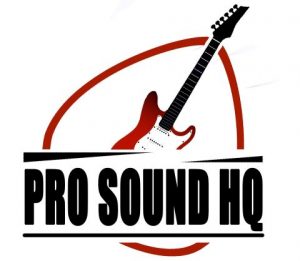The Stratocaster and Jaguar are two iconic electric guitars originally produced by Fender. There are now many Stratocasters and Jaguars produced by both Fender and Squier to suit a range of budgets.
In this article, I’ll compare the two guitar types in terms of their design, sound, look and feel, to help you decide which is the best for you.
The Quick Answer
The Stratocaster has a more regular and symmetrical body shape compared to the Jaguar which has an offset design. The Jaguar is slightly heavier and has a shorter scale length so sounds darker and heavier compared to the Stratocaster which sounds brighter but also slightly thinner.
Comparing Features
First let’s look at the specifications and design differences. Here is a table comparing the American Standard/ Original versions of the Fender Stratocaster and Fender Jaguar.
Keep in mind that these are just two versions of each guitar types, and some features may be slightly different depending on the model in question (more on that later).
| Feature | Stratocaster | Jaguar |
| Body Shape | Double Cutaway | Offset Double Cutaway |
| Body Wood | Alder | Alder |
| Pickups | Three Single-Coils | Two Single-Coils |
| Neck Shape | C-Shape | C-Shape |
| Neck Wood | Maple | Maple |
| Neck Construction | Bolt-On | Bolt-On |
| Frets | 22 | 22 |
| Fretboard Wood | Rosewood or Maple | Rosewood |
| Scale Length | 25.5” | 24” |
| Bridge | Synchronised Tremolo | Floating Tremolo |
| Number of Tone Knobs | 2 | 2 |
| Weight | 8 pounds (3.6 kg) | 8.5 pounds (3.9 kg) |
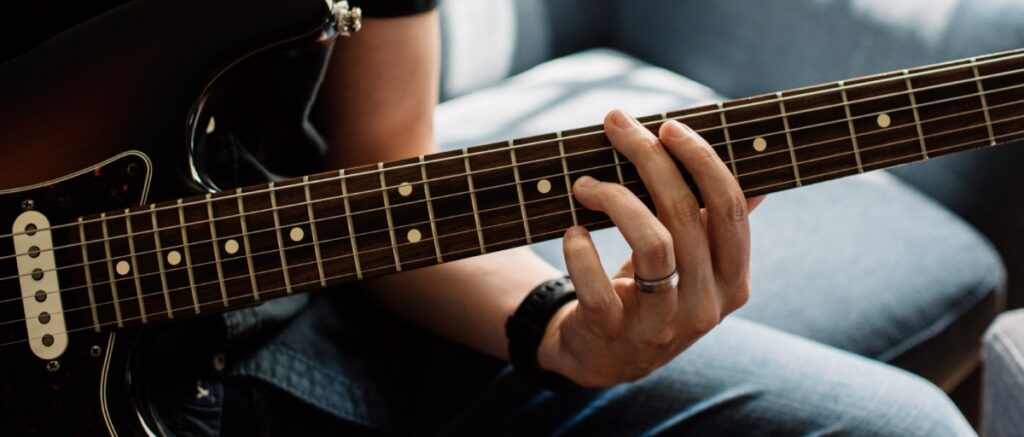
How Does the Tone Differ?
There are a lot of similarities in the features of these two guitars, but also some subtle differences which impact the sound.
Stratocasters generally sound brighter when played clean, whilst Jaguars sound darker and fuller. Jaguars have more bite and attack which is particularly evident when using gain, compared to Stratocasters which sound a bit flatter. This is mainly due to the shorter scale length on the Jaguar.
Both guitars are considered “bright” sounding, particularly when compared to something like a Les Paul. The main reason for this is due to the single coil pickups. However, it is possible to find both Jaguars and Strats with humbucker pickup configurations. Notably, the Kurt Cobain Jaguar editions have humbucker pickups, and the Fender Player Jaguar has a H-S configuration.
The most notable difference between the two guitars which gives them each a more distinct tone, is the scale length. The controls are also very different on the Strat and Jaguar, and each instrument is quite versatile but utilises different controls to achieve different sounds.
I will go in-depth into the controls on each guitar in the “design differences” section later in the article, but briefly, the Stratocaster has 3 pickups and a 5-way selector to achieve different tones, whilst the Jaguar has a lead/ rhythm switch allowing you to quickly change the overall tone easily.
This helps compensate for the lack of versatility that a two pickup design on a Jaguar would otherwise provide.
Here is a video comparing the tone of a Squier Strat and a Squier Jaguar back-to-back. I’ve set the video so it starts at the right moment to hear the demo.
Look and Feel
It’s not all about the tone when choosing a guitar. You need to consider which model feels the most comfortable to play, and looks the best to you. Despite both being double cutaway guitars, they do look and feel pretty different.
The main difference in appearance between the Jaguar and Stratocaster, is the body shape. The Stratocaster has a regular and fairly symmetrical shape, whilst the Jaguar has an offset body. The offset design was created to make the Jaguar more comfortable to sit and stand with.
The Jaguar is supposed to sit more comfortably on the knee, and causes the guitar’s headstock to tilt more towards the player whilst stood up. This makes the guitar easier for some players to use, although it’s all personal preference.
Want to learn more about offset guitars? Check out my article discussing the pros and cons of offset body electric guitars.
In terms of the appearance, the Jaguar has more metal on the body surrounding the controls than the Strat which is all plastic (except for the bridge and input jack). Both guitars come in a range of colour options, however the Jaguar is usually considered more alternative and quirky, which matches the offset design. The Stratocaster is considered more classic and traditional, and the colour options generally reflect this.
The bridge design also looks pretty different on the two guitars. The Jaguar has a floating tremolo which is mounted on a large section of metal quite far back from the saddles, whilst the Strat has a tremolo bridge which is shorter and located closer to the bridge pickup.
Similarities:
- Similar C-shape neck
- 22 fret neck
- Double cutaway body
- Bolt-on neck construction
Differences:
- Shorter scale length on the Jaguar
- Stratocaster has a fairly symetrical body compared to the offset body on the Jaguar
- The Jaguar is slightly heavier
- The Stratocaster has a longer scale length
- The controls and pickup design
- Bridge design
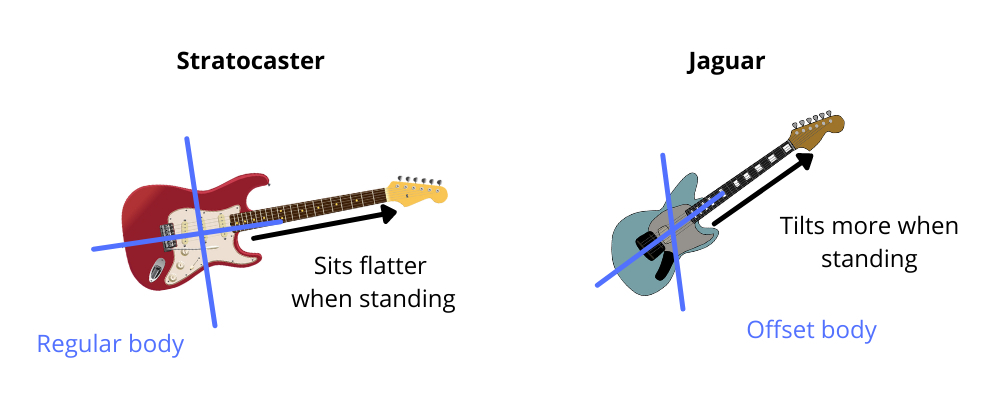
Check out my complete comparison between the Stratocaster and Telecaster
Comparing the Ranges
Before we take a more in-depth look at the design differences between the two models of guitar, I wanted to compare the ranges that Squier and Fender offer.
I have made some tables to show pretty much every Standard (non limited edition) Jaguar and Strat in the range, and the price (based on Guitar Center at the time of writing). It’s split into price brackets and each table is ordered from the lowest to the highest price, so you can easily identify the models available within your budget.
Remember to scroll sideways if you’re on mobile to see the full table!
Entry-Level and Low-End (under $500)
| Guitar | Origin | Body Wood | Bridge | Price |
| Squier Bullet Stratocaster | Indonesia | Basswood | Fixed | $180 |
| Squier Affinity Stratocaster | China | Alder | 6-saddle tremolo | $230 |
| Squier Contemporary Stratocaster | China | Poplar | Floyd Rose | $400 |
| Squier Classic Vibe Stratocaster | Indonesia | Poplar/ Pine | 6-saddle tremolo | $430 |
| Squier Classic Vibe 70’s Jaguar | Indonesia | Poplar | 6-saddle tremolo | $480 |
| Squier Contemporary Jaguar | China | Poplar | Fixed | $480 |
Mid-Range ($500-$1200)
| Guitar | Origin | Body Wood | Bridge | Price | |
| Fender Player Stratocaster | Mexico | Alder | 2-point tremolo | $750 | |
| Fender Player Jaguar | Mexico | Alder | Floating Tremolo | $830 | |
| Fender Deluxe Stratocaster | Mexico | Alder | 2-point tremolo | $950 | |
| Fender Vintera Stratocaster | Mexico | Alder | 6-saddle tremolo | $950 | |
| Fender Vintera ‘60s Jaguar | Mexico | Alder | Floating Tremolo | $1150 | |
| Fender Boxer Strat | Japan | Basswood | Floyd Rose | $1200 | |
| Fender American Performer Strat | America | Alder | 2-point tremolo | $1200 |
High-End (over $1200)
| Guitar | Origin | Body Wood | Bridge | Price | |
| Fender Kurt Cobain Jaguar | America | Alder | Floating Tremolo | $1400 | |
| Fender American Professional Strat | America | Alder | 2-point tremolo | $1500 | |
| Fender American Showcase Strat | America | Alder | 2-point tremolo | $1700 | |
| Fender American Ultra Strat | America | Alder | Tremolo | $1900 | |
| Fender American Original Strat | America | Alder | Tremolo | $2000 | |
| Fender American Original ‘60s Jaguar | America | Alder | Floating Tremolo | $2150 |
Key Points:
- The Jaguar range is much more limited than the Stratocaster range.
- Stratocasters are generally cheaper than Jaguars of the same specification.
Guitar Center are always the first place I look at when I’m interested in a new electric guitar because have a huge range of models for sale and always have some excellent deals on. Here’s a link to take you directly to Guitar Center’s electric guitar range so you can see all the offers available at the moment.
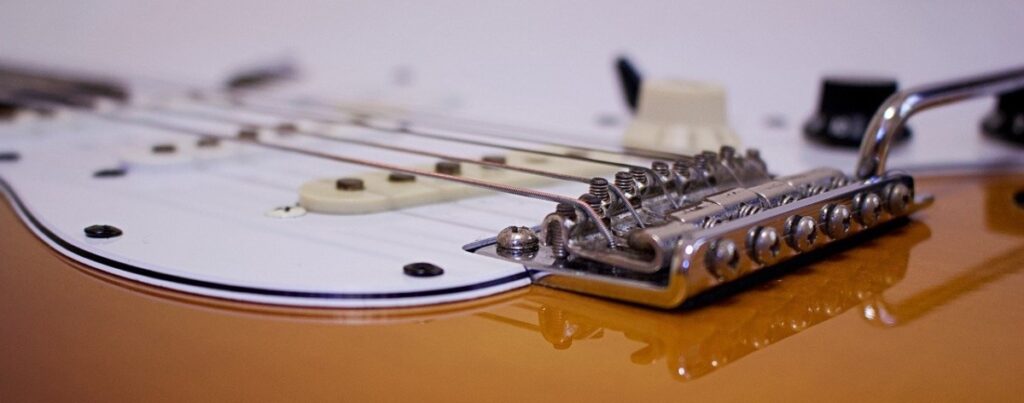
Specific Design Differences and Similarities
Now we’ve been through the basic differences and similarities between these two iconic guitar shapes, I wanted to take a more in-depth look at the designs of each guitar and how this affects the tone, look, feel and playability of each instrument.
Body
The Jaguar and Stratocaster traditionally have alder bodies and a double cutaway design. The main difference is that the Jaguar has an offset body, causing it to tilt upwards more when playing stood-up, than the Stratocaster which has a more regular and symmetrical shape that sits flatter. The Jaguar has a larger body than the Stratocaster, contributing to its slightly heavier weight (around 0.5 pounds more).
Neck
The Jaguar and Stratocaster both have similar C-shape necks on most models, however, the exact shape can vary depending on which model is in question, and which era it was based on. They also have a 22 fret neck made of maple and a rosewood or maple fretboard. The only significant difference, is that the Jaguar has a shorter scale length of 24″ compared to the Stratocaster’s 25.5″ scale.
Pickups
Both the Jaguar and Stratocaster traditionally have single coil pickups, however, it is more common to see a Jaguar featuring humbucker pickups on some models. You can however find Stratocasters with different pickup configurations, the most popular being a H-S-S configuration which has a humbucker in the bridge position instead of a single coil. Stratocasters have 3 single coil pickups, whereas Jaguars have only 2 pickups which can be either single coil or humbuckers depending on the model.
The Stratocaster typically sounds brighter than the Jaguar which has a darker tone. However, both guitars are considered fairly versatile due to the different controls available.
Controls
The Stratocaster and Jaguar have reasonably complex controls which can be a bit confusing for new players. Here’s a quick rundown of the controls on each guitar.
- The Stratocaster has a 3 pickup configuration and a 5-way pickup selector, allowing you to activate different pickups to achieve different tones. It has two tone controls (one controls the middle and neck pickup, and the other controls the bridge pickup), and a single master volume control.
- The Jaguar has 2 pickups and works by using a lead/ rhythm switch. When the lead switch is activated, the neck or bridge pickup can be activated alone or together, and the mid-tone cut control can also be used. The lead switch also allows you to use the master tone and volume control. When the rhythm switch is on, only the neck pickup will be activated, and the rhythm tone and volume controls will be active.
Here are some diagrams to help demonstrate. You can also have a look at my article on using a Stratocaster or using a Jaguar to learn more.
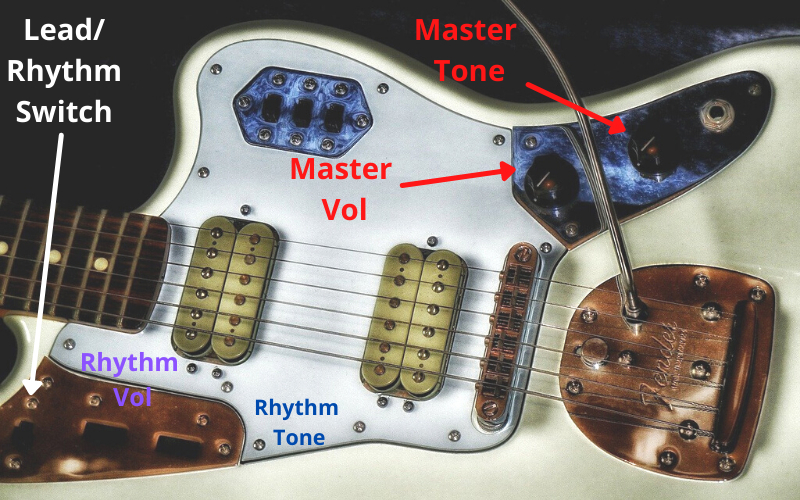
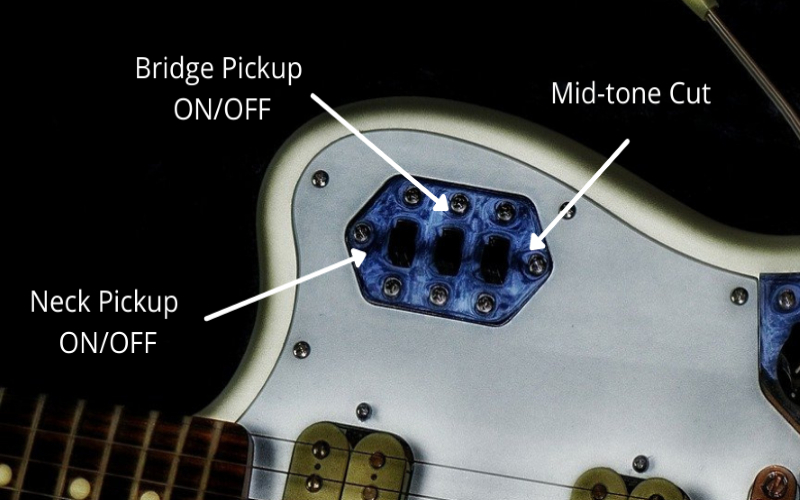
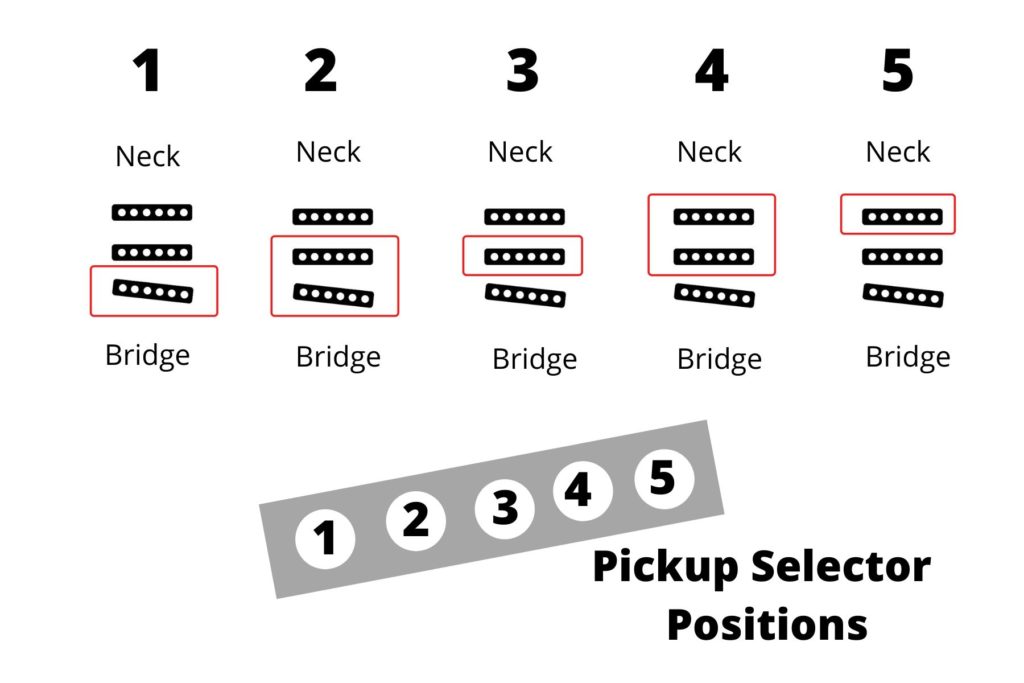
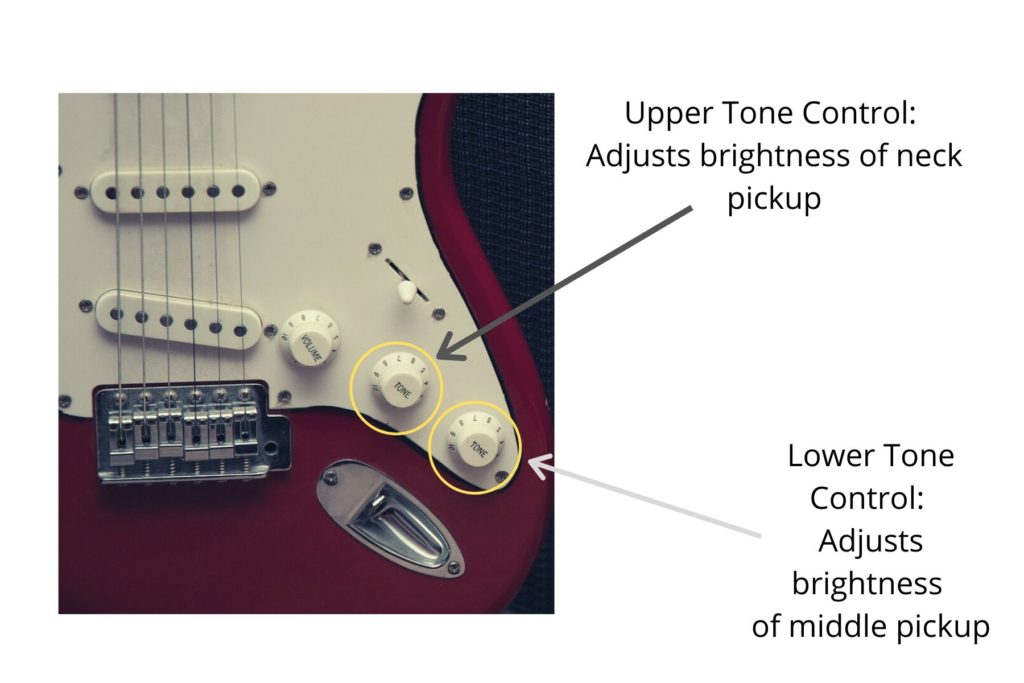
Bridge
Both the Jaguar and Stratocaster traditionally have a tremolo bridge, however they have different designs.
The Stratocaster has a more vintage-style synchronised tremolo, which means the bridge itself moves when the tremolo arm is in use. The Jaguar instead has a floating tremolo, where the bridge stays in position and the tremolo arm itself feels more bouncy. The Jaguar’s tremolo also has a fixed position option, which is useful if a string snaps as it avoids the guitar going out of tune completely.
The Stratocasters tremolo design is said to give it better sustain, however, the Jaguar tremolo bridge design helps the guitar to keep its intonation better.
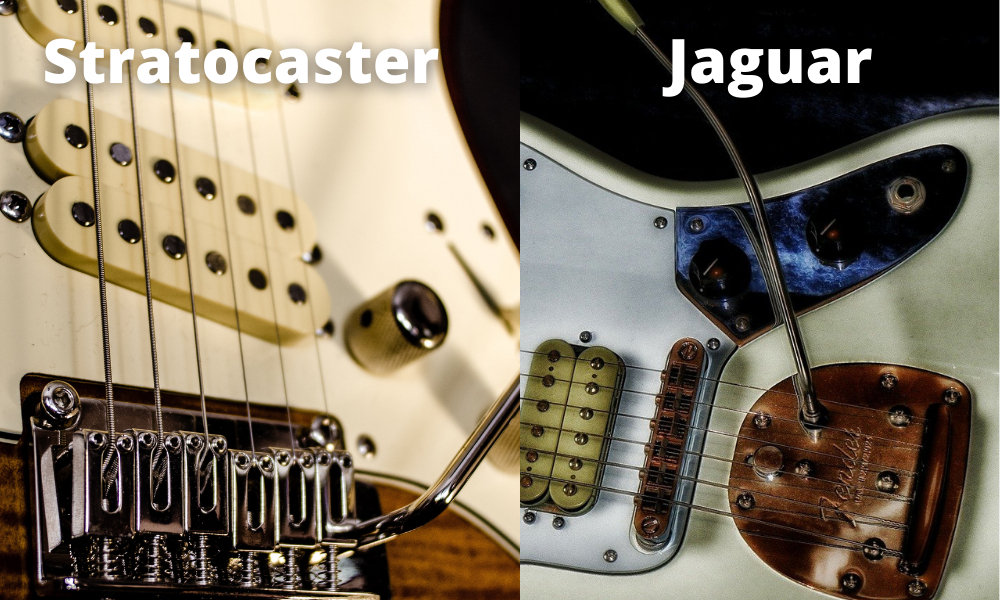
Which Should You Choose?
The best way to figure out which guitar is best for you, is to head down to your local store and try it out. Even if you’re a beginner, you can sit and stand with the guitar to get a feel for it, and ask the store assistant to play a few riffs so you can figure out which tone you prefer. With that said, here are a few key points you can use to help make your decision:
- Stratocasters sound brighter and generally sound a bit nicer when player clean, so are popular amongst blues and country players.
- Jaguars sound darker and heavier than Stratocasters so suit higher gain amp settings more, making them more suitable if you want to try rock and metal.
- The Stratocaster is available in more colour options and pickup configurations and has more models available to suit different budgets.
For Beginners?
The Stratocaster is usually chosen over the Jaguar for beginners, because it starts at a lower price. However, both guitars are comfortable to use and suit a wide range of music styles. The Jaguar is arguably more versatile as it suits rock and high gain amp settings slightly better than the Stratocaster.
I’ve written a complete buyer’s guide for electric guitars which takes you through all the things you need to consider and a step-by-step method to narrowing down your selection and choosing the best option. Here is a link to the article.
Here are some more articles you might find interesting:
